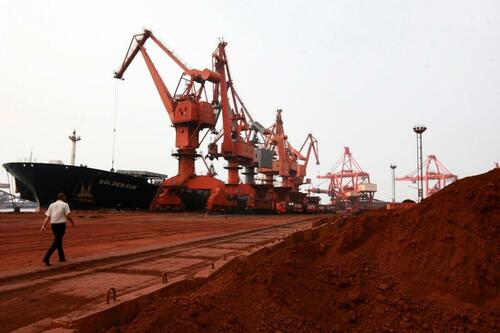
Authored by John Mills via The Epoch Times,
In the waning days of the Biden administration, the constriction of Chinese access to semiconductors continues.
On Dec. 2, the U.S. Department of Commerce announced another round of rules aimed at inhibiting the flow of semiconductors to China. The Department’s Bureau of Industry and Security (BIS) released new rules, stating they are “designed to further impair the People’s Republic of China’s (PRC) capability to produce advanced-node semiconductors that can be used in the next generation of advanced weapon systems and in artificial intelligence (AI) and advanced computing, which have significant military applications.”
Likely adding urgency to the Dec. 2 action is a U.S. Senate report from September showing how Russia’s war effort in Ukraine is substantially supported by China. The report highlights the Chinese regime’s aggressive worldwide campaign to purchase U.S. chips and use third-party countries to re-ship the items to Russia, China, Iran, and North Korea. Within days of the semiconductor ban, China retaliated by banning the export of some key rare earth metals (REMs) used in chip production. According to the MIT Technology Review, China ceased the export of three critical REMs: gallium, germanium, and antimony. In addition, the export of superhard materials used in manufacturing was banned.
Why does China now disallow the export of REMs when it needs the chips? It’s because the availability of REMs is one of China’s advantages in the trade war with the United States.
China’s Strategic Play in Rare Earth Metals
While China is vulnerable in energy and food production, REMs provide a significant advantage. China controls 60–70 percent of the world’s extraction of REMs and 90 percent of its refining capacity. Since the 1980s, China has viewed REMs as a strategic asset.
“Recognizing the strategic importance of these metals, China began heavily subsidizing its rare earth mining and processing industries. This allowed Chinese producers to undercut international competitors, driving many mining operations in the U.S., Australia, and elsewhere out of business,” reports Zimtu Capital Corporation of Canada.
Western countries, by contrast, regarded the extraction and processing of REMs as dirty, labor-intensive, and best left to other nations. Meanwhile, China prioritized this sector. “Lax environmental regulations and low labor costs gave China a cost advantage that other nations struggled to match,” Zimtu noted. While these practices drew criticism, they enabled China to dominate the market.
The American government has prioritized semiconductor production in partnership with Taiwan, Japan, South Korea, and the Netherlands. However, by controlling the extraction and refining of REMs, China can undermine and disrupt the production of semiconductors. If China cannot obtain semiconductors from the American-dominated process, it can ensure no one else can either by leveraging control over the REM supply chain.
A Promising US Response to China
While Taiwan’s TSMC is the world’s largest semiconductor producer, it requires REMs from China for its renowned chip-building process. President-elect Donald Trump’s appointment of key officials—such as Peter Navarro as senior counselor for trade and manufacturing—signals a strong stance on trade. Navarro, known for his aggressive trade policies, has been empowered to use tariffs and other measures to compel China to adhere to fair trade practices.
Navarro could receive significant support from former U.S. Trade Representative Robert Lighthizer, who shares Navarro’s views on the malign nature of China’s trade practices. Ambassador Rick Grenell, appointed to the new role of presidential envoy for special missions, adds further muscle to this team. Grenell’s past close relationship with Trump suggests he will play a critical role in resolving obstacles related to REMs. Together, this team will likely focus on reviving U.S. REM extraction and refining capabilities while countering China’s REM dominance.
‘Refine, Baby, Refine’
Although many REMs exist outside of China, their production has been largely shuttered due to environmental concerns. By revisiting government regulations to balance environmental safety and economic necessity, the United States can reinvigorate its REM extraction and refining industry. For example, antimony is already being extracted in Idaho, and the United States and partner nations possess significant deposits of other REMs, including gallium and germanium. However, refining capacity remains the primary bottleneck.
A new corollary to Trump’s famous “drill, baby, drill” might be “refine, baby, refine”—a rallying cry to reestablish REM refining processes in the United States and trusted foreign partners.
Leadership, determination, and investment are needed to bring new refining plants online.
The resources exist; the challenge is overcoming the legacy of globalism that led Western nations to abandon REM industries. With the incoming Trump administration, the United States appears poised to rebuild its REM supply chain and hold the Chinese regime accountable.
* * *
Views expressed in this article are opinions of the author and do not necessarily reflect the views of The Epoch Times or ZeroHedge.
Authored by John Mills via The Epoch Times,
In the waning days of the Biden administration, the constriction of Chinese access to semiconductors continues.
On Dec. 2, the U.S. Department of Commerce announced another round of rules aimed at inhibiting the flow of semiconductors to China. The Department’s Bureau of Industry and Security (BIS) released new rules, stating they are “designed to further impair the People’s Republic of China’s (PRC) capability to produce advanced-node semiconductors that can be used in the next generation of advanced weapon systems and in artificial intelligence (AI) and advanced computing, which have significant military applications.”
Likely adding urgency to the Dec. 2 action is a U.S. Senate report from September showing how Russia’s war effort in Ukraine is substantially supported by China. The report highlights the Chinese regime’s aggressive worldwide campaign to purchase U.S. chips and use third-party countries to re-ship the items to Russia, China, Iran, and North Korea. Within days of the semiconductor ban, China retaliated by banning the export of some key rare earth metals (REMs) used in chip production. According to the MIT Technology Review, China ceased the export of three critical REMs: gallium, germanium, and antimony. In addition, the export of superhard materials used in manufacturing was banned.
Why does China now disallow the export of REMs when it needs the chips? It’s because the availability of REMs is one of China’s advantages in the trade war with the United States.
China’s Strategic Play in Rare Earth Metals
While China is vulnerable in energy and food production, REMs provide a significant advantage. China controls 60–70 percent of the world’s extraction of REMs and 90 percent of its refining capacity. Since the 1980s, China has viewed REMs as a strategic asset.
“Recognizing the strategic importance of these metals, China began heavily subsidizing its rare earth mining and processing industries. This allowed Chinese producers to undercut international competitors, driving many mining operations in the U.S., Australia, and elsewhere out of business,” reports Zimtu Capital Corporation of Canada.
Western countries, by contrast, regarded the extraction and processing of REMs as dirty, labor-intensive, and best left to other nations. Meanwhile, China prioritized this sector. “Lax environmental regulations and low labor costs gave China a cost advantage that other nations struggled to match,” Zimtu noted. While these practices drew criticism, they enabled China to dominate the market.
The American government has prioritized semiconductor production in partnership with Taiwan, Japan, South Korea, and the Netherlands. However, by controlling the extraction and refining of REMs, China can undermine and disrupt the production of semiconductors. If China cannot obtain semiconductors from the American-dominated process, it can ensure no one else can either by leveraging control over the REM supply chain.
A Promising US Response to China
While Taiwan’s TSMC is the world’s largest semiconductor producer, it requires REMs from China for its renowned chip-building process. President-elect Donald Trump’s appointment of key officials—such as Peter Navarro as senior counselor for trade and manufacturing—signals a strong stance on trade. Navarro, known for his aggressive trade policies, has been empowered to use tariffs and other measures to compel China to adhere to fair trade practices.
Navarro could receive significant support from former U.S. Trade Representative Robert Lighthizer, who shares Navarro’s views on the malign nature of China’s trade practices. Ambassador Rick Grenell, appointed to the new role of presidential envoy for special missions, adds further muscle to this team. Grenell’s past close relationship with Trump suggests he will play a critical role in resolving obstacles related to REMs. Together, this team will likely focus on reviving U.S. REM extraction and refining capabilities while countering China’s REM dominance.
‘Refine, Baby, Refine’
Although many REMs exist outside of China, their production has been largely shuttered due to environmental concerns. By revisiting government regulations to balance environmental safety and economic necessity, the United States can reinvigorate its REM extraction and refining industry. For example, antimony is already being extracted in Idaho, and the United States and partner nations possess significant deposits of other REMs, including gallium and germanium. However, refining capacity remains the primary bottleneck.
A new corollary to Trump’s famous “drill, baby, drill” might be “refine, baby, refine”—a rallying cry to reestablish REM refining processes in the United States and trusted foreign partners.
Leadership, determination, and investment are needed to bring new refining plants online.
The resources exist; the challenge is overcoming the legacy of globalism that led Western nations to abandon REM industries. With the incoming Trump administration, the United States appears poised to rebuild its REM supply chain and hold the Chinese regime accountable.
* * *
Views expressed in this article are opinions of the author and do not necessarily reflect the views of The Epoch Times or ZeroHedge.
Loading…




